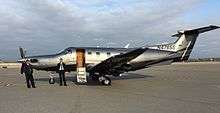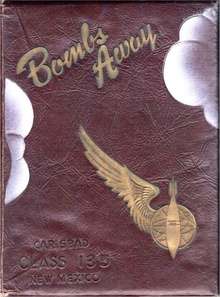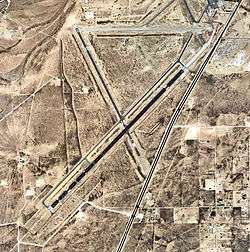Cavern City Air Terminal
| Cavern City Air Terminal (former Carlsbad Army Airfield) | |||||||||||||||||||||||
|---|---|---|---|---|---|---|---|---|---|---|---|---|---|---|---|---|---|---|---|---|---|---|---|
|
USGS 2006 orthophoto | |||||||||||||||||||||||
| Summary | |||||||||||||||||||||||
| Airport type | Public | ||||||||||||||||||||||
| Owner | City of Carlsbad | ||||||||||||||||||||||
| Serves | Carlsbad, New Mexico | ||||||||||||||||||||||
| Elevation AMSL | 3,295 ft / 1,004 m | ||||||||||||||||||||||
| Coordinates | 32°20′15″N 104°15′48″W / 32.33750°N 104.26333°WCoordinates: 32°20′15″N 104°15′48″W / 32.33750°N 104.26333°W | ||||||||||||||||||||||
| Map | |||||||||||||||||||||||
 CNM  CNM Location of airport in New Mexico / United States | |||||||||||||||||||||||
| Runways | |||||||||||||||||||||||
| |||||||||||||||||||||||
| Statistics (2009) | |||||||||||||||||||||||
| |||||||||||||||||||||||
Cavern City Air Terminal (IATA: CNM, ICAO: KCNM, FAA LID: CNM) is a public use airport in Eddy County, New Mexico, United States.[1] It is owned by the city of Carlsbad and located five nautical miles (6 mi, 9 km) southwest of its central business district.[1] The airport is served by one commercial airline, with scheduled passenger service subsidized by the Essential Air Service program.
As per Federal Aviation Administration records, the airport had 2,207 passenger boardings (enplanements) in calendar year 2008,[2] 3,417 enplanements in 2009, and 2,606 in 2010.[3] It is included in the National Plan of Integrated Airport Systems for 2011–2015, which categorized it as a general aviation facility (the commercial service category requires at least 2,500 enplanements per year).[4]
Facilities and aircraft
Cavern City Air Terminal covers an area of 1,980 acres (801 ha) at an elevation of 3,295 feet (1,004 m) above mean sea level. It has four runways with asphalt surfaces: 3/21 is 7,854 by 150 feet (2,394 x 46 m); 14L/32R is 4,616 by 150 feet (1,407 x 46 m); 14R/32L is 5,837 by 100 feet (1,779 x 30 m); 8/26 is 5,334 by 75 feet (1,626 x 23 m).[1]
For the 12-month period ending July 30, 2009, the airport had 6,862 aircraft operations, an average of 18 per day: 53% general aviation, 39% scheduled commercial, 4% air taxi, and 4% military. At that time there were 24 aircraft based at this airport: 67% single-engine, 21% multi-engine, and 12% helicopter.[1]
Airline and destinations
The following airline offers scheduled passenger service:
| Airlines | Destinations |
|---|---|
| Boutique Air | Albuquerque, Dallas/Fort Worth |

Boutique Air operates Pilatus PC-12 turboprop aircraft on all flights. The aircraft is equipped with an eight-seat executive interior. A two-person flight crew is utilized by Boutique.
Historical Airline Service
Continental Airlines was the first commercial air carrier to serve Carlsbad. Continental began service on May 14, 1940 with flights to El Paso and Denver, the latter included stops in Albuquerque and several other cities. Aircraft used were Lockheed Model 10 Electra's and Lockheed Lodestar's followed by the Douglas DC-3.
With the end of World War II, flights to Denver were discontinued and new flights were added going east to San Antonio and Kansas City, each making several stops. Flights to El Paso and Albuquerque remained. A small commuter carrier named Bison Airlines served the city for a couple years in the early 1960s as well. In 1963 Continental transferred its route authority for Carlsbad to Trans-Texas Airways which modified the eastbound flights to go directly to Dallas. Trans-Texas later changed their name to Texas International Airlines (TI) and replaced the DC-3's with 50-seat Convair 600 turboprop aircraft.
For a short time in the late 1970s, TI upgraded all flights with 85-seat Douglas DC-9-10 jets but reverted to the Convair 600's after about a year. In 1979 TI ended their service transferring their route authority over to commuter carriers Air Midwest and Crown Airlines. Crown operated flights to Albuquerque with Cessna 402 and Piper Navajo aircraft but went out of business in 1980.
Air Midwest used 17-seat Swearingen Metroliners on flights to Albuquerque and Midland/Odessa. In 1984 Mesa Airlines began service on the same routes using Beechcraft 99 and Beechcraft 1900 airliners. Air Midwest then left the city two years later. For a very short time in the spring of 1987, Continental Express operated by Trans Colorado Airlines served the city with flights to Albuquerque and El Paso also using Metroliners. Mesa continued their service until 2007 when they, like their predecessors, grew to large and discontinued serving small cities with small aircraft. Pacific Wings, dba New Mexico Airlines, then stepped in with flights to Albuquerque, El Paso, and Midland/Odessa but used much smaller and unpressurized Cessna 208 Caravans. Flights to El Paso and Midland were later dropped and the carrier ended all service in 2015 when Boutique Air took over. Boutique began with one daily flight to Albuquerque and one to Dallas/Ft. Worth (DFW) using 8-seat Pilatus PC-12 aircraft.
The airport also saw service by Big Sky Airlines for a brief time in 2000/2001 which operated flights to DFW using Swearingen Metroliners.[5]
Carlsbad Army Airfield


Established by the United States Army Air Corps in 1942 as Carlsbad Army Airfield, the facility was activated on October 12, 1942. Assigned to United States Army Air Forces West Coast Training Center (later Western Training Command) as an advanced (level 3) twin-engine training airfield. Began training flying cadets under the 940th Two-Engine Flying Training Detachment. Had a local axillary airfield for emergency and overflow landings.
The twin-engine school was replaced by Bombardier's School in mid-1942. Bombardier school lasted from 12 to 18 weeks during which a student dropped approximately 160 bombs, both in daytime and at night. Precise records were maintained of his hits and misses; the elimination rate was 12%. Upon graduation, a bombardier was transferred to an operational Second or Third Air Force training unit to join a crew being trained for overseas duty. The bombardier trainer used was the Beech AT-11 Kansan.
Inactivated on September 30, 1945 at the end of World War II and turned over to the Army Corps of Engineers. Eventually discharged to the War Assets Administration (WAA) and became a civil airport.
See also
- New Mexico World War II Army Airfields
- 38th Flying Training Wing (World War II)
- List of airports in New Mexico
- Bat bomb
References
- 1 2 3 4 5 FAA Airport Master Record for CNM (Form 5010 PDF). Federal Aviation Administration. Effective May 31, 2012.
- ↑ "Enplanements for CY 2008" (PDF, 1.0 MB). CY 2008 Passenger Boarding and All-Cargo Data. Federal Aviation Administration. December 18, 2009.
- ↑ "Enplanements for CY 2010" (PDF, 189 KB). CY 2010 Passenger Boarding and All-Cargo Data. Federal Aviation Administration. October 4, 2011.
- ↑ "2011–2015 NPIAS Report, Appendix A" (PDF). National Plan of Integrated Airport Systems. Federal Aviation Administration. October 4, 2010. Archived from the original (PDF, 2.03 MB) on 2012-09-27.
- ↑ Timetables from all the airlines that have served Carlsbad, NM
Other sources
-
 This article incorporates public domain material from the Air Force Historical Research Agency website http://www.afhra.af.mil/.
This article incorporates public domain material from the Air Force Historical Research Agency website http://www.afhra.af.mil/. - Shaw, Frederick J. (2004), Locating Air Force Base Sites History’s Legacy, Air Force History and Museums Program, United States Air Force, Washington DC, 2004.
- Manning, Thomas A. (2005), History of Air Education and Training Command, 1942–2002. Office of History and Research, Headquarters, AETC, Randolph AFB, Texas ASIN: B000NYX3PC
External links
| Wikimedia Commons has media related to Carlsbad Army Airfield. |
- Chandler Aviation, the fixed-base operator (FBO)
- Aerial image as of October 1997 from USGS The National Map
- FAA Terminal Procedures for CNM, effective July 20, 2017
- Resources for this airport:
- FAA airport information for CNM
- AirNav airport information for KCNM
- ASN accident history for CNM
- FlightAware airport information and live flight tracker
- NOAA/NWS latest weather observations
- SkyVector aeronautical chart, Terminal Procedures


